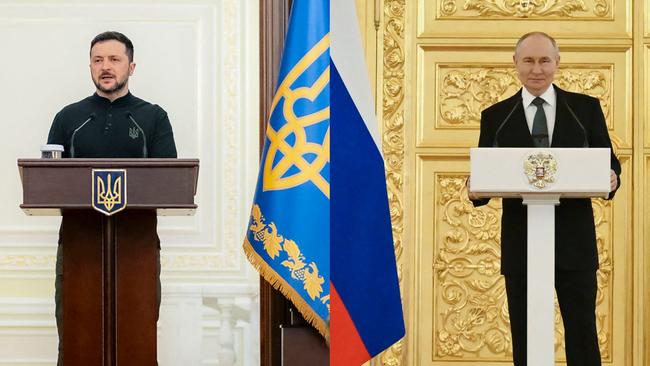Prospects for Ukraine peace talks dim as Trump, Putin stay away
Volodymyr Zelensky has landed in Ankara for talks with Turkey’s president but Vladimir Putin and Donald Trump won’t join the peace negotiations.

Neither Russian President Vladimir Putin nor US President Donald Trump will attend talks in Istanbul with Ukrainian President Volodymyr Zelensky, originally planned for Thursday (local time).
Ignoring the Ukrainian President’s call to meet for the direct high-level talks in Turkey, Putin instead dispatched to Istanbul a team of junior officials, making it uncertain that negotiations between the warring nations would occur at all.
Trump has since confirmed that he won’t travel to Turkey either.
The Russian team is set to be led by Putin’s aide Vladimir Medinsky and deputy defence minister Alexander Fomin, the same men whom Putin dispatched to negotiate Ukraine’s surrender in the early days of the war. The last session of these talks occurred in Istanbul in March 2022, and the negotiations fell apart as Russia suffered a military defeat and withdrew its forces from Kyiv and other parts of northern Ukraine.
Zelensky, who is slated to arrive in Turkish capital Ankara on Thursday for separate talks with Turkish President Recep Tayyip Erdogan, has said he would be ready to meet with Putin if the Russian leader also came to Turkey. President Trump, who has made ending the war in Ukraine his key foreign-policy priority, has also indicated he might have attended.
But Putin’s decision to send junior officials instead foreclosed the possibility of any breakthrough, Western diplomats say. By naming Medinsky, a former culture minister, as head of the delegation, they say, Putin has indicated that he’s unwilling to budge and seeks the same objectives as in 2022: the end of Ukraine as a sovereign state that is able to defend itself.
Senior U.S. officials are also headed to Istanbul, though it isn’t clear whom they would meet and when.
At the heart of the extraordinary back-and-forth over potential talks in Turkey are the competing priorities that make a peace deal only a remote possibility. President Trump has threatened to walk away from the talks if no progress is achieved. Both sides are attempting to show their willingness to move forward without yielding on their ultimate goals.
Ukrainian officials said that they would only meet the Russian team to discuss how to implement and monitor an unconditional, 30-day ceasefire proposed by the Trump administration. Ukraine agreed to such a ceasefire in March but Putin hasn’t so far endorsed the idea.
Putin wants essentially a Ukrainian capitulation, even as Russian forces are struggling to advance. Russia managed to gain less than 1% of Ukrainian territory over the past two years, despite taking hundreds of thousands of casualties and losing vast stocks of equipment.
The initial Istanbul talks, in 2022, resulted in a draft document designed to neuter Ukraine. The text was never completed or endorsed by Zelensky.
At that time, a much bigger part of Ukraine was under Russian occupation, and Western heavy weapons hadn’t yet started to flow to Kyiv. The draft agreements from that round of negotiations foresaw a ban on foreign military aid, a drastic reduction in the size of the Ukrainian military and a series of other restrictions on Ukrainian sovereignty.
Those are the conditions that Kyiv and its European allies are certain to reject under current circumstances, one of the reasons the Zelensky administration wants to hold negotiations in Ankara rather than Istanbul, so as to mark a break.
The question now is which side Trump comes down on. He has grown increasingly frustrated with Putin’s reluctance to halt his invasion, but has shown no inclination to punish Russia with sanctions. His top representative for talks with Russia, Steve Witkoff, has in the past agreed with Putin’s suggestions of using the 2022 Istanbul drafts as the basis for new talks, while Secretary of State Marco Rubio has rejected Russian demands for any curbs on Ukraine’s ability to defend itself. Witkoff, Rubio and Trump’s special envoy for Ukraine, Keith Kellogg, are all expected to reach Istanbul by Friday, Turkish officials say.
“Trump needs to believe that Putin actually lies,” Zelensky said at a news conference on Tuesday in Kyiv. “We should do our part. Sensibly approach this issue, to show that it’s not us that is slowing down the process.”
After claiming he could end the three-year conflict in one day, Trump is nearly four months into his second administration with little to show for the diplomatic effort he started. In recent days, Trump has told aides he would consider getting Russia and Ukraine to talk directly and seriously, a win on its own, allowing the U.S. to pull back from the negotiations and focus on other priorities.
Trump has similarly launched quick-fire, high-stakes diplomatic initiatives, including nuclear talks with Iran, trade negotiations with China, a truce with Houthi rebels, and ceasefire and hostage-release negotiations between Israel and Hamas, with whom the U.S. separately arranged the release of the last American hostage in Gaza.
Elsewhere, European Union officials backed a 17th round of sanctions against Russia on Wednesday, this time targeting some 200 ships that are deemed part of Moscow’s “shadow fleet” that transports illicit oil. Further sanctions are planned, with some officials acknowledging that what’s been done so far hasn’t been enough to make Russia halt its invasion.
“This war has to end,” Ursula von der Leyen, president of the European Commission, wrote Wednesday on X. “We will keep the pressure high on the Kremlin.”
The Wall St Journal



To join the conversation, please log in. Don't have an account? Register
Join the conversation, you are commenting as Logout